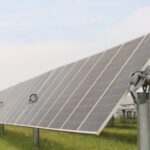Virginia environmentalists are coming to grips with the fact that while solar farms may help fight global warming, they’re not always good for the local environment. In the wealthy northern Piedmont, known for its wineries, horse farms and scenic vistas, some residents have complained about the clear-cutting of forest to make way to acres upon acres of solar panels.
“The number-one thing I hear from communities in which we serve is concern about the loss of farms and forests with regard to these projects,” said Dan Holmes, director of state policy for the Piedmont Environmental Council, tells the Virginia Mercury.
A recent Virginia Commonwealth University study found that roughly 8,000 of the 14,000 acres disturbed in Virginia for solar installations were previously forested. The loss of wooded land and the compaction of cropland contribute to run-off and erosion that sets back the effort to improve water quality in the Chesapeake Bay.
Legislation hammered out in the General Assembly this year, reports the Mercury, attempts to achieve a balance between protecting the local environment while allowing development of utility-scale solar farms to proceed. Projects affecting more than 50 acres of forested land or 10 acres of prime farmland will have to provide mitigation for those impacts, with the criteria to be worked out in a convening of stakeholders by the Department of Environmental Quality.
Chip Dicks, a lobbyist representing solar developers and renewable energy buyers, worries that the mitigation could be defined so narrowly as to preclude development on prime agricultural and forested lands entirely. That “would basically stop in its tracks most major solar projects in Virginia,” he has said.
“The numbers seem arbitrary. There’s no particular scientific reason why it’s 10 acres and not 20 acres,” said Harry Godfrey, executive director of Virginia Advanced Energy Economy, a trade group representing solar developers.
Imagine that: yet another industry hobbled by totally arbitrary environmental criteria.
Bacon’s bottom line: Congratulations, environmentalists! Your lobbying and lawfare have made it increasingly difficult to develop any kind of energy infrastructure anywhere! You successfully took out the gas pipelines. But your new rules, if applied with anything resembling logical consistency, could potentially cripple the solar industry that would replace natural gas. And we haven’t even begun to talk about the necessity of building electric transmission lines to import electricity from outside the state when the sun isn’t shining, or the eventual disposal of toxic chemicals — cadmium telluride, copper indium selenide, cadmium gallium (di)selenide, copper indium gallium (di)selenide, hexafluoroethane, lead, and polyvinyl fluoride — found in solar panels!


Leave a Reply
You must be logged in to post a comment.